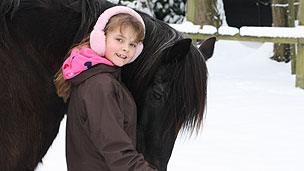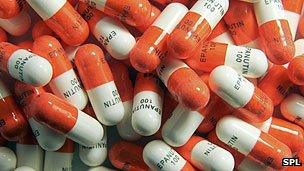Brain surgery boost for children with severe epilepsy
- Published

Riding is just one of the activities Rachel can now do after brain surgery for her epilepsy
Epileptic seizures are a frightening experience for anyone, but particularly for children who cannot control their seizures with medication.
For these children, and their parents, life can often be difficult and unpredictable.
However, if a particular part of the brain can be pinpointed as the cause of the seizures, brain surgery can be an effective treatment.
Great Ormond Street Hospital in London is currently the main centre in the UK for this type of specialised surgery, but Bristol, Manchester/Liverpool and Birmingham are set to develop similar expertise later this year.
As a result, doctors say they will be able to treat three times as many children with drug-resistant epilepsy in England and Wales - from 125 to around 350 each year by 2015-2016.
Rachel, from Essex, was nearly eight years old when surgeons at Great Ormond Street removed a piece of malformed tissue on the right-hand side of her brain.
Rachel and her family had spent years experimenting with different drugs, trying to control her sudden and distressing seizures which left her physically drained, reclusive and withdrawn.
Fix it
Her father Nick says it was a relief when doctors said they had identified the root cause of the problem.
"We thought it was amazing. We finally thought we had a way out of it all.
"The surgeons offered us a 70-80% success rate. They set out the risks for us but they were confident, they said 'we can fix this'."
Around 60,000 children in the UK have epilepsy.
While most children with epilepsy enjoy full and active lives, around one-third do not respond to medication and continue to experience seizures.
This can have a major impact on family life, as Rachel's father recalls.
"At the height of it, my wife couldn't go further than 15 minutes from school in case Rachel had a seizure and needed to be sedated or taken home. Even going to the shops became an exercise requiring almost military precision planning," Nick says.
"We had paramedics out to house on numerous occasions, some we even got to know by name. We even got trained in how to administer emergency medication for extreme seizure episodes."
For Rachel it meant that she could be walking along and blank out suddenly, her muscles contorting, arms and legs going rigid, eyes going up into her head.
"It was like she went into shutdown mode," her father remembers.
"She was constantly tired, had no life or energy in her from the combined effect of the medication and the impact of the seizures. She was always picking up bruises and scrapes from where she would fall or hit something when she had a seizure. It was a living nightmare."
'Low risk'
Professor Helen Cross, an expert in epilepsy surgery from University College London's Institute of Child Health and Great Ormond Street Hospital, says there are many different types of seizures.
"Epilepsy isn't one condition and a person may have more than one type of seizure.

Only two-thirds of children with epilepsy respond to medication
"Those suitable for surgery will have failed on at least two drugs and when we evaluate them, we should see that the seizures are coming from one small bit of the brain."
And what are the risks of surgery on the brain?
"Surgery carries low risk. We wouldn't offer it if it were not going to be of benefit."
But Prof Cross acknowledges that some clinicians still see surgery as a last resort.
"Some feel that surgery is going to lead to more problems - but each individual is different.
"If they know the child is going to be resistant to drugs quite quickly then the earlier we do the surgery the better the outcome.
"That's better than finding out 10 years down the line that surgery could have been an option."
'Transformed'
Simon Wigglesworth, chief executive of Epilepsy Action, says there is strong evidence that brain surgery can transform lives.
"IQ and education ability are improved by surgery, and there is evidence that the earlier it's done the better the cognitive outcomes.
"Seizures are horrible things. Surgery can allow children to go into adulthood free of seizures, able to drive, get a job and lead a normal life."
In her early years, Rachel couldn't keep up with her peers and missed out on a lot of school learning and activities, such was the impact of her condition and the medication.
Looking back, her family remembers her being depressed and wanting to sleep all the time.
Since the surgery, in February 2010, Rachel's life has totally transformed.
"It was like she had a personality transplant," Nick says.
"Now she has energy, she's smiling and laughing. The lights are back on in her eyes."
After the surgery Rachel was home within a week. The hospital said they thought she would be back at school in a couple of months but in fact she returned to school within a month.
"She's made up a lot of ground at school, she loves science, history, art, she has a very creative side that we never saw pre-surgery. The teachers are blown away by her," says Nick.
"She now does all the things she liked to do but couldn't always do because of her condition. She rides horses, swims every week and did a mile at Easter.
"To our family, friends and people who know us, it's the closest thing to a modern miracle. We can now start to lead a normal life."
- Published22 February 2012
- Published25 November 2011
- Published14 October 2011